新实用英语视听说教程第1册最新版教学课件内置音视频U1 (下)
新视野大学英语视听说第一册unit one课件

到了高中后,我渴望继续学习英语。然而,高中时 的经历与以前大不相同。以前,老师对所有的学生 都很耐心,而新老师则总是惩罚答错的学生。
Para. 3b
Whenever we answered incorrectly, she pointed a long stick at us and, shaking it up and down, shouted, “No! No! No!” It didn’t take me long to lose my eagerness to answer questions. Not only did I lose my joy in answering questions, but I also lost my desire to say anything at all in English. 每当有谁回答错了,她就会用长教鞭指着我们,上 下挥舞着大喊:“错 ! 错 ! 错!”没有多久,我便 不再渴望回答问题了。我不仅失去了回答问题的乐 趣,而且根本就不想再用英语说半个字。
Pre-reading activities
Lead-in, Listening to tape, Words and clause
Text comprehension, Language points, Text structure, Main ideas …
While-reading activities
n. [C, U] a thing that you are given because you have done sth good, worked hard, etc 奖赏;回报 eg: There's a reward for whoever finishes first. As a reward for passing the exams, she got a new bike from her parents. 她因为通过了考试,父母给她买了一辆新 自行车作为奖励。
新世纪视听说1(第三版)Unit1电子教案PPT课件

1 Unit New Friends, New Faces Lesson A Meeting new people Lesson B What does he look like?
An English Video Course 1 视听说教程(第三版)电子教案 1
Vocabulary Link
Online pen pals
(1) What’s your name?
Name:
My name is _________ .
(2) How old are you?
Age:
I’m _____.
(3) Where are you from?
City, country: I’m from ______ .
(4) What language do you speak? (5) What’s your major?
1 Unit New Friends, New Faces Lesson A Meeting new people Lesson B What does he look like? Listening
Activity 1 Hi, I’m Fiona.
Language Notes
Proper names
speaker with his or her interest.
II ■
a. Hiromi
(a )
b. Miguel
(c )
c. Fiona
( b)
1 Unit New Friends, New Faces Lesson A Meeting new people Lesson B What does he look like?
An English Video Course 1 视听说教程(第三版)电子教案 1
新世纪视听说第一册unit1 new friends ,new faces

1 Unit New Friends, New Faces Lesson A Meeting new people Lesson B What does he look like? Listening
Activity 1 Hi, I’m Fiona.
Language Notes
Proper names
1. first name 2. languages 3. age 4. city 5. interests 6. country 7. e-mail address 8. major 9. last name
HOME PEN PALS BY COUNTRY YOUR PROFILE FAQs
Meet people from all over the world. To join, click here.
√=yes ×=no
Go dancing Watch TV Write e-mail Play tennis
Jason
√ × √ ×
1 Jason _g_o_es__d_a_n_ci_n_g_________. He d_o_e_s_n_’_t _w_a_t_c_h_T_V________. He w__r_it_e_s _e_-m__a_il___________. He d_o_e_s_n_’_t _p_la_y__te_n_n_i_s______.
新世纪大学英语(第二版) 视听说教程(3rd Edition)电子教案
An English Video Course 1 视听说教程(3rd Edition)电子教案 1
Unit 1 New Friends, New Faces
1 Unit New Friends, New Faces Lesson A Meeting new people Lesson B What does he look like?
新实用英语视听说教程第1册最新版教学课件内置音视频U4
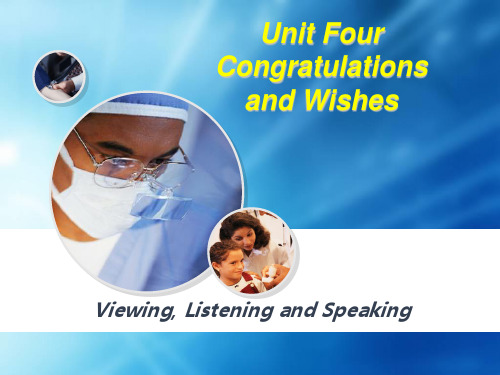
Episode 2
Task 3 Watch the episode again and decide whether the following statements are True or False.
( F ) 1. Ali could only tell his Mum what he wishes for.
Unit Four Congratulations
and Wishes
Viewing, Listening and Speaking
Episode 1
Episode 2
Episode 3
Congratulations, You’re Famous
I Wish I Had More Ice Cream
.
A. at an office B. at a party C. at a chemist’s D. at a supermarket
✓ 2. Why does the man congratulate Mr. Yamamoto? A. There is a big prize for him. B. An article appeared in the newspaper.
Hussein: Here Ali: Wow, look
comes at it all!
(3) Gallons
andgegtasllioc!nks
you tell your wiIshha, dit r(o2o) m of it! I wish (4) cream
for
more
ice .
.
Mrs. Ali: I
supermarket.
( F ) 2. Jim is one of the employees of Mr. Yamamoto’s family
全新版大学英语视听说教程1全

全新版大学英语视听说教程1全《全新版大学英语视听说教程 1 全》在当今全球化的时代,英语作为一门国际通用语言,其重要性不言而喻。
对于大学生来说,掌握良好的英语听说能力不仅有助于学业的进步,更是未来职业发展和个人成长的必备技能。
全新版大学英语视听说教程 1 全的出现,为广大学生提供了一个系统、全面且有效的学习平台。
这套教程首先在内容设计上独具匠心。
它涵盖了丰富多样的主题,从日常生活的点滴到国际时事的热点,从校园生活的趣事到职场工作的场景,应有尽有。
这样广泛的主题范围,使得学生在学习的过程中能够接触到各种真实且实用的语言情境,从而更好地理解和运用英语。
在听力训练方面,教程中的音频材料质量上乘。
语音清晰、语速适中,既符合初学者的接受能力,又能够逐步提升学生的听力水平。
而且,音频材料的形式也多种多样,包括对话、独白、新闻报道等,让学生适应不同的听力题型和风格。
同时,每个听力练习都配有精心设计的题目,从理解主旨大意到捕捉细节信息,从推断隐含意义到辨别语音语调,全方位地锻炼学生的听力技巧。
而在口语训练部分,教程更是注重引导学生开口说英语。
通过提供丰富的口语话题和示例,鼓励学生模仿、跟读,逐渐培养出正确的发音和语调。
同时,还设置了小组讨论、角色扮演等互动环节,让学生在实际交流中锻炼口语表达能力,克服说英语的恐惧心理,增强自信心。
全新版大学英语视听说教程 1 全还充分利用了现代多媒体技术。
除了传统的教材和音频,还配套了在线学习资源,如视频、动画等,使学习过程更加生动有趣。
这些多媒体资源不仅能够吸引学生的注意力,提高学习的积极性,还能够为学生提供更加直观的语言输入,帮助他们更好地理解和记忆。
此外,教程的编排也十分合理。
每个单元都有明确的学习目标和重点,各个部分之间相互衔接、循序渐进。
先通过听力输入让学生积累语言知识,然后通过口语练习让学生输出所学内容,实现了从输入到输出的完整学习过程。
而且,教程中还设置了复习和巩固的环节,帮助学生及时总结所学,查缺补漏。
新实用英语视听说教程第1册最新版教学课件内置音视频U5
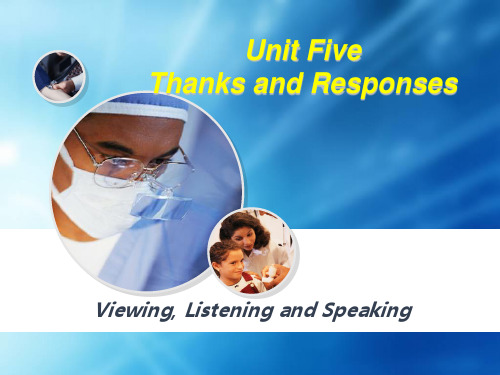
Jennifer: Hi. Eduardo. Nice to—
Eduardo: (2) It’s Eduardo. (3) E-D-U-A-R-D-O . Jennifer: Oh,ardo. (4) Sorry . It’s (5) nice to meet you.
✓A. To carry boxes. B. To carry bags. C. To show the way. D. To make two boxes.
2. Where can this conversation take place?
5. Sandra’s
.
✓A. dress is new B. shoes are new C. blouse is new D. pants are new
6. Sandra’s suitcase
.
✓ A. is in the taxi B. is not in the taxi C. is in the train D. is in the van
things. Sandra: Anne! Anne: WhTahte?y’re
Sandra: MyAgrelasses. (1)in
not here.
Anne: (2) I they (3) the bathroom?
Sandra: (4) hedreon’t know.
your
Anne: No, (5)
5. A: May I use your computer ? B: Yes, of course. But I need to do my homework 20 minutes later.
新实用英语视听说教程第1册最新版教学课件内置音视频U1 (上)
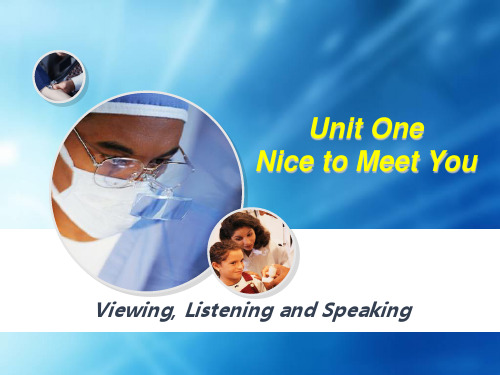
C. She’s a salesperson. 2. Why doesn’t Lynn like her job?
A. The money isn’t good. B. She doesn’t like her boss.
✓C. She works long hours.
✓ A. France B. Canada C. The United States
4. Marie teaches .
✓ A. French B. business management C. English
5. Rick and Sachiko are studying .
✓ A. Mathematics B. English C. business management
to know? Paula: Of course ______ Ido.
Episode 2
Task 2 Watch the episode again and choose the best answer to each question.
1. What does Lynn do? A. She’s a hotel worker.
3. What does Lynn want to do?
✓ A. Work in a hotel.
B. Work for an airline. C. Work in a resta 3 Watch the episode again and decide whether the following statements are True or False.
Episode 3
So that opens up the doors of conversation. While you are at the dinner party you have a responsibility to several guests. That is going to include the person directly in front of you and the person to your right and the person to your left. If it’s a small table of six then you could actually interact with everyone. A very large banquet table then you had better only being responsible to interacting with the person across from you and the person on either side of you. Your responsibility is to add value to the meal with interesting and inter-lectural conversation. So, when I am looking at this person I want to be very interested in indicating that with my body and language. I am going to nod at them and say “fascinating and tell me more”. When I was in Italy last year, I experienced something similar. How did you end up handling that situation? Now I am speaking to this person. However, we have other guests as well. So I might catch up someone else’s eyes and say they are very interested. And then I say “John I see that you like to add some comments to the Italy experience”. Then that would include them as well. So, it’s looking, nodding of the head. “Fascinating. Tell me more.”
新实用英语视听说教程第1册最新版教学课件内置音视频U2
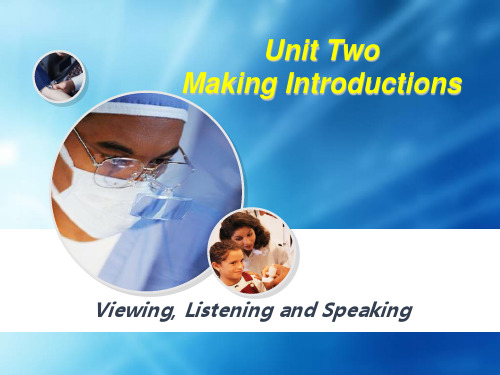
.
✓ A. restaurant B. hotel C. company D. bank
Episode 1 Task 3 Watch the episode again and decide whether the following statements are True or False.
5. What color is Anne’s bag? It’s
.
✓ A. black B. orange C. red D. blue
6. Why does Anne say sorry to Mark? Because the bag is
.
✓ A. Large B. light C. strong D. heavy
Unit Two Making Introductions
Viewing, Listenin-in Video Comprehension Listening Comprehension Speaking Development
Workplace Context
Episode 3
Episode 3
Welcome to English class, English in 3 minutes, to learn English. Hi how’s it going? I am Alisha. Nice to meet you. In this series we are going to learn some easy ways to ask and answer common questions in English. It’s really useful and only takes 3 minutes. In this lesson you are going to learn new more common ways to ask and answer the question “how are you” in English. You have probably learned “how are you” and “I am fine” in textbooks before, but in the United States, people will usually ask this question and answer it in a different way. First, Let’s review. If someone says “how are you”, you can say “I am fine”. Here are some other ways to answer: pretty good. This means about the same as “I am fine”. We also have “Not bad”. You can use this if you are feeling just ok or so-so. let’s look at our question again: how are you. This is the most well-known way of asking how someone is. You could use it when you want to be polite. But now, Let’s look at some different ways to ask how someone is. These ways are more casual and much more common. First, hey, how’s it going? You can answer this in many ways. If you are feeling good you can say “Good”, “Pretty good”, “Not bad”. Here is a tip.
新一代大学英语视听说教程1 U2 PPT 课件

Local food Local food
Warm-up
Additional Activity
Read the following quotes about healthy eating. Try to explain the quotes wห้องสมุดไป่ตู้th examples or your personal experiences.
Warm-up
Listening and Speaking
Topic One
Genetically modified food
Genetically modified food
Listening and understanding
1 Listen to a conversation on GM food and decide whether the
enriched with vitamins or bananas with vaccines.
• Some food companies will dominate the
6) _p_o_o_r__c_o_u_n_t_r_ie_s_ even more than they
• GM food can be used to change do today if we start to rely on GM food.
over a decade, there is still extensive controversy about it. Work in two groups and hold an informal debate on the topic “Is GM food beneficial?”. You can base your argument on what you’ve heard from the conversation, your own experience and reasoning, and what you’ve learned from books, newspapers, or the Internet.
外研社2023新职业英语视听说教程1_课件Unit 1
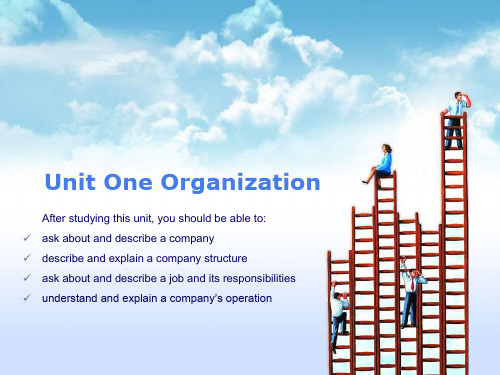
Period 4: Watching 2 → Speaking 2 (Task 3-4)
After Class Unit File + Supplementary Listening + Project
Learning Focus
Knowledge: To build up the vocabulary about company; To learn about a company description, a company structure, a job
Listen to the conversation again and tick (√) the correct answer to each question. Script
1. What are Nova’s products famous for?
☐ A. Price and design. ☐ B. Price and quality.
Listening 1-Task 1
1. Warming-up Fill in the blanks with relevant information.
Business _d_r_in_k_s_____________ Headquarters _A_t_la_n__ta_,_U_S__A_______
1. Benjamin Yang comes to the job fair to recruit new staff.
False Here is my résumé. I’d appreciate it if you could arrange me ______________________________________________________ _a_n_i_n_te_r_v_ie_w_.____________________________________________ 2. Anna Brooks is introducing Nova to Benjamin Yang.
unit 1大学英语视听说课件第一册
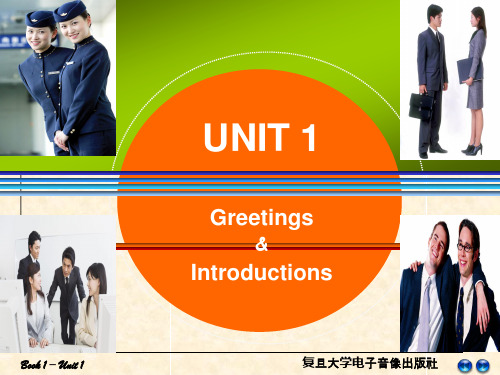
Book 1 – Unit 1
Section One Task 1
Intensive Listening
Listening Focus
1. Ten wealthy men met twelve beggars and fed them with fresh eggs and bread. 2. The bad man ran back to gather his black handbag. 3. Lots and lots of clocks and watches are on sale in the shops. 4. She thought she ought to take a walk before four o’clock. 5. Mike is flying a kite high in the sky by the riverside.
Book 1 – Unit 1
Section One
Intensive Listening
Task 2 Listening Practice MiniA. Mini-dialogues
Dialogue 1 A) √ In a library. office. C) In a booking B) On a ship. D) On an airplane.
Book 1 – Unit 1
Section One
Dialogue 4 A) He has no idea about it. B) He’s quite interested in it. C) He enjoys it. D) He doesn’t likห้องสมุดไป่ตู้ it.
Intensive Listening
- 1、下载文档前请自行甄别文档内容的完整性,平台不提供额外的编辑、内容补充、找答案等附加服务。
- 2、"仅部分预览"的文档,不可在线预览部分如存在完整性等问题,可反馈申请退款(可完整预览的文档不适用该条件!)。
- 3、如文档侵犯您的权益,请联系客服反馈,我们会尽快为您处理(人工客服工作时间:9:00-18:30)。
Passage Listening
2. Directions: Listen to the passage again and answer the following questions in brief. (1) When was handshaking first introduced into China?
D. To see Mr. Johnson off.
5. Where is Mr. Johnson now?
A. He’s in New York. B. He’s in Guangzhou.
✓C. He’s in Beijing. D. He’s in Tianjin.
Passage Listening
4. A: I’m ___s_o_h_a_p_p_y_ to meet you today. B: I’m ___re_a_l_ly happy we met too.
5. A: Hi, I’m Mick Harrison. B: __N_ic_e__to__m_e_e_t_y_o_u__. I’m Jack Lewis.
B. To give his thanks to Peter’s family. C. To send his thanks to Peter’s girl friend. D. To give his regards to Peter’s girl friend.
Situational Dialogues
Thanks to Dr. Sun Yat-sen, many unknown and unforeseen practices were imported from Europe: to work on weekdays and to have day off on Sundays, the solar calendar, the brushing of teeth, and a few.
例如: He was here up to a moment ago. 2. by the way: 另外;顺便说(用于转入新的话题) 3. on business: 出差 4. on holiday: 度假 5. get along: 进展 6. give one’s regards to someone: 向……问好 7. on behalf of: 为了……的利益;代表
✓ A. England. B. America. C. China. D. Canada.
2. What’s Zhang Xiaoyu?
✓A. He is an interpreter. B. He is a guide.
C. He is a director. D. He is a translator.
3. Where does Mr.Zhang work?
✓A. China International Travel Service. B. China National Travel Service.
C. Local Travel Service.
D. A computer company in China.
Handshaking was first introduced into China after the overthrow of the Qing Dynasty at the beginning of last century..
(2) According to the passage, what practices were imported into China thanks to Dr. Sun Yat-sen?
4. For what purpose do Mr.Zhang and Mr.Liu go to the airport?
A. To take a plane to America. B. To meet their relatives from America.
✓C. To meet Mr.Johnson.
(3) In old China, what would people do to show respect for others when they met or parted?
In old China, the courteous behavior was that when people met or parted, they bowed to each other and cupped their own hands one in the other, moving them up and down several times in front of the chest.
Passage Listening
2. Directions: Listen to the passage again and answer the following questions in brief. (4) In earlier times, what should people behave when greeting a person of higher social standing?
1. Directions: Listen to the passage and fill in the missing words with the exact words you hear.
Handshaking was first introduced into China after the overthrow of the Qing Dynasty at the beginning of (1) last century. Besides the concept of a republic, (2) thanks to Dr. Sun Yat-sen, many unknown and unforeseen (3)practices were imported from Europe: to work on (4) weekdaysand to have day off on (5)Sunday,s the solar calendar, the brushing of teeth, and a few. In old China, the courteous (6) behavior was that when people met or parted, they bowed to each other and cupped their own hands one in the other, moving them up and down several times in front of the (7) chest . In earlier times when (8) greeting a person of superior social standing, it was customary to (9) raise the hands as high as the forehead and to execute a low bow. This tradition has a history of more than (10) 2,000 years, but nowadays it is seldom used except in the Spring Festival or on other special occasions.
Situational Dialogues
You will hear a dialogue between Peter and Henry. They happen to meet in the street one day.
1. Where did Peter go?
✓ A. Beijing. B. New York. C. Washington. D. Chicago.
1. A: Excuse me,_a_r_e_y_o_u__ Mr.Turner? B: Yes. You ___m__u_s_t _b_e_ Mr.Jenkins.
2. A: Where is Jerry? B: In New York ___o_n__b_u_s_in_e_s_s.
3. A: What’s your name? B: My __fi_rs_t_n_a_m__e is Henry. And you? A: Kathy. It’s __e_a_s_y_ to remember.
Zhang meets Mr.Johnson at the airport. He introduces himself and Liu Hailiang,director of the China International Travel Service.
1. Where does Mr. Johnson come from?
(5) Is the tradition of raising the hands to the forehead and executing a low bow still used today in China?
No.
Passage Listening
2. Directions: Listen to the passage again and answer the following questions in brief. Notes: 1. up to/up till: 直到
Situational Dialogues
